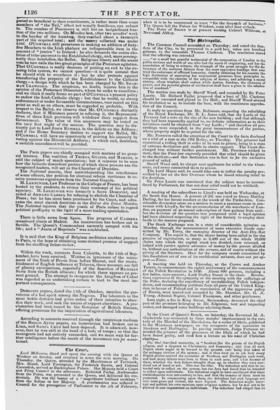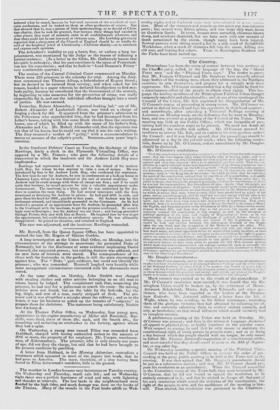In the Court of Queen's Bench, on Saturday, the Reverend
M. A. Gathercole was sentenced to three months' imprisonment in the cus- tody of the Marshal of the Marshalsea, for a series of libels, published in the Watchman newspaper, on the occupants of the nunneries in Stockton and Darlington. In passing sentence, Judge Patteson re- minded the prisoner of the grossness of the libels of which he bad been found guilty, and read him a lecture on his want of Christian charity— The libel described nunneries, as " brothels ;for the priests of the Popish religion, and a disgrace to Christianity and humanity; said that all such Popish stews ought to be burned to the ground, care being first taken of the unhappy victims of the system ; aud it then went on to ask how many Popish priests entered the nunneries at Stockton and Darlington each week, and how many infants were born in them in each year, and what became of them, whether the holy fathers brought them up, or whether they were mur- dered out of hand or not. This was the libel. The defendant said that he in- tended only to reflect on the system, but the Jury had found that he intended to reflect upon individuals. The defendant ought to have recollected that these establishments were not contrary to law, and that the inmates of them must be protected. In commenting upon them, the defendant hail used language not only most gross and violent, but most bigoted. The defendant might enter- tain and publish his own opinions upon religious matters, but he was not to be allowed to cast imputations on individuals. The defendant had alleged that he believed what he stated, because be had read accounts of the mischiefs of anti. cular confessions, and he looked on them as often productive of crimes. But that showed that he was a person of little understanding, or so devoid of Chris. Sian charity, that he took for granted, that because these things had existed in other places, they must of necessity exist in all establishments whatever, and that there could not be one innocent or virtuous nun. His Lordship grievously regretted that a clergyman of the Church of England should be so totally de- void of the brightest jewel of Christianity—Christian charity—as to entertain and express such opinions. The defendant's inability to pay a heavy fine, or endure a long im- prisonment, was mentioned by the Judge as the reason of inflicting a lenient sentence. LIn a letter to the Globe, Mr. Gathercole boasts that his spirit is unbroken ; that his past exertions in the cause of Protestant- ism are his consolation ; and that he finds in "Lord Penman's Priory" very comfortable quarters.1 The session of the Central Criminal Court commenced on Monday. There were 278 prisoners in the calendar for trial. Among the Jury. men summoned was Thomas Allsop, a haberdasher of Regent Street ; but he desired to be excused from serving; and when asked for his reason, handed in a paper wherein he declared his objection to find any- body guilty, because he considered that the Government of the country, by neglecting to take measures for the prevention of crime, was really responsible for it, and not the individual offenders brought into a court of justice. He was excused.
Yesterday, Robert Alexander, a "genteel-looking lad," son of Mr. Robert Alexander of Leadenhall Street, was tried on a charge of forging a check for 301. It appeared from the prisoner's admission to the Policeman who apprehended him, that he had decamped from his father's house, taking with him some blank checks from the counting. house, one of which he filled up with the name of his father's firm, Alexander and Co. Mr. Robert Alexander said, that the signature was not that of his house, but he could not say that it was his son's writing. The Jury returned a verdict of "guilty," with a recommendation to mercy on account of the culprit's youth. Sentence—two years' impri- sonment.



























 Previous page
Previous page